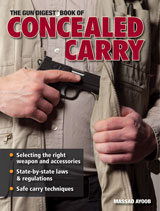 Michael Bender of the Personal Protection Academy demonstrates defensive handgun technique, but stresses the legal and financial consequences of a defensive gun use (DGU). |
Physical Consequences
Many of you have seen photos of gunshot wound victims. Ugly stuff. Even for those who survived those injuries, their wounds had to have been debilitating for a lifetime.
Emotional Consequences
Shooting someone — or getting shot — is likely to affect your outlook on the world, perhaps for the rest of your days.
Financial Consequences
Defending yourself from prosecution and/or civil litigation can be expensive — just a huge financial burden for the average Joe. Expect to shell out $10,000 or more in attorney retainer and legal expenses if you even draw that gun, let alone shoot someone with it. If the thing goes bang, $100,000 can disappear quickly in your legal struggle to stay out of prison.
Legal Consequences
You’ll have a very small window to get this right. Do this wrong, and you might go to prison. I’ll repeat that. Do this wrong, and you might lose your freedom.
After my clients leave my training, using lethal force or threatening to use it will be their choice. Their survival and their freedom afterward will depend not only on their skills and tactics they have or acquire during training, but also on their lawful use of deadly force.
Always keep in mind that you’re not obligated to pull your gun, and unless someone is about to be killed or seriously physically injured, leaving that weapon in its holster just might be the smartest thing to do.
Staying out of prison, means conditioning yourself to assess your risks in every instance before pulling that gun. Asking yourself, “What are my chances of successfully defending myself or others, without intolerable risks to me or them? If I draw my weapon, am I prepared to use it? Can I actually pull the trigger if I can’t find another way to get to safety or protect those I care about?”
Nothing like playing poker. No bluffing here. No false bravado. Stakes are lots higher and could very well become permanent in some fashion.
I ask my clients to keep this adage in mind: If you use a gun to defend yourself, the police and the courts are sure to take a lot longer and stronger look at you than if you swing a purse, briefcase, big stick, use pepper spray, or even watch a carjacker disappear under your front bumper. Be assured using a gun will provoke lots of face-time with law enforcement folks.
| “You’ll have a very small window to get this right. Do this wrong, and you might go to prison. I’ll repeat that. Do this wrong, and you might lose your freedom.” |
The conditions for legally using self-defense … lots to understand.
During this and the next three DGU Advisors, I’ll talk about four very important conditions. The four conditions I discuss in my courses are what I’ve come to understand to be nearly universal self-defense law across the country.
The foundation of my own training, and what I simply pass along in my courses and herein, comes from trainers taught by Joe Olson (Professor of Law at Hamline University, longtime political activist in 2nd Amendment issues, former Board member of the National Rifle Association, former federal prosecutor, and experienced defense counsel) and from the writings of Massad Ayoob (police chief, trainer, lecturer, educator, author, editor, and internationally recognized leading authority on lawful use of force).
Although I’ve found some states use somewhat different terminology, I believe information provided by Professor Olson and Mr. Ayoob to be foundational self-defense law across our nation.
The Four Conditions
Commit them to memory.
- You must be a reluctant participant.
- You must be reasonably in immediate fear of death or great bodily harm.
- No lesser force will do.
- Retreat is not practical.
With today’s DGU Advisor, I’ll discuss the first … You must be a reluctant participant.
This simply means you didn’t proactively cultivate the exchange that escalated to use or threat of deadly force.
It also means you took reasonable steps to avoid the conflict or tried to get out of Dodge before it erupted.
There may come a time in your life when you determine you’re about to become a victim of an act of violence, a forcible felony. Unless you act decisively, you’re going to be mugged, severely assaulted, maimed, raped, or murdered.
Be a Reluctant Participant
As a reluctant participant you had no part in starting the mess. You even apologized profusely to Mr. Wolf … tried to get out of Dodge before it blew up … didn’t cause any of it.
Keep in mind that your adversary need not be a complete stranger … might be a violent ex-spouse, co-worker holding a grudge, disgruntled employee, stalker.
As a Sheepdog you can do some things to proactively establish your status as a reluctant participant. We should be rather thankful for all the public cameras out there … at gas stations, ATMs, parking lots, stores of all types. If one of those Big Brother devices records your reluctance to participate in a confrontation, that’s a very good thing. Likewise witnesses, if they see you demonstrate your reluctance to participate in a confrontation.
 Prepare Now: Order the Gun Digest book of Concealed Carry. Click Here. |
I want you to keep in mind that a Sheepdog’s reasons for carrying a gun are quite a bit different than reasons required of police officers. Law enforcement folks have to make arrests, capture bad guys, intervene in family disputes, and the like. They have a primary weapon and maybe a backup, plus extra magazines, baton, pepper spray, taser, handcuffs … tools of their trade.
As Sheepdogs we have a much different purpose with a gun. Our obligation is to put distance between ourselves and trouble. It’s a tool of last resort. So it’s probably not a good idea to carry a primary gun, backup gun, six extra mags of nuclear-tipped hollow points, knife, those Chinese throwing stars you got for Christmas last year, blackjack, and a bunch of other combat gear when you go out to dinner. Wearing the Batman belt won’t look good to your peers on the jury when they’re trying to objectively decide if you’ve been a reluctant participant.
By the way, reluctant participant status applies to a third party you decide to help, too. Tough to know if the guy on the floor getting the soup kicked out of him is the good guy or the wolf resisting arrest by a rough-looking undercover cop.
My recommendation is this: Short of imminent death or great bodily harm situations, it will almost invariably be best to call the police. Let them sort it out.
The Importance of Articulation
Sheepdogs, please, please keep in mind you must be able to articulate WHY you used force. Being able to articulate to a Trier of Fact that you were a reluctant participant might keep you from going to prison.
Will you be able to articulate your claim of justifiable self-defense in court of law if an aggressive prosecutor pursues you for unlawful use of force? For example, “I tried to get away from him, Mr. Prosecutor. I apologized for any misunderstandings … did my best to calm the situation down … told Mr. Wolf I didn’t want any trouble, and my wife and I tried to leave. He followed us into the parking lot and attacked me with a club. I didn’t have a club. I was afraid that if he connected with my head, I’d be wounded severely, maybe mortally. That’s why I discharged my weapon in self-defense … the only means I had to survive without grave injury to my wife or myself.”
The best self-defense tactic will always be to avoid putting yourself in a position where you will need to shoot. The majority of violent crimes are committed in certain neighborhoods. You likely know where they are in your environment. Stay out of them. And plan how to avoid conflict or what you might do to lower the level of conflict if you see a situation developing.
Be a reluctant participant!
That’s all I have for you this time around. The next DGU Advisor topic will discuss the second condition. You must be reasonably in immediate fear of death or great bodily harm.
Be safe out there Sheepdogs.
For more information about Michael Bender and the Personal Protection Academy, call Toll-free (888) OK SHOOT or (888) 657-4668 or visit www.PPA-WI.com.

![Best Concealed Carry Guns In 2025 [Field Tested] Wilson Combat EDC X9S 1](https://gundigest.com/wp-content/uploads/Wilson-Combat-EDC-X9S-1-324x160.jpg)


![Best 9mm Carbine: Affordable PCCs [Tested] Ruger Carbine Shooting](https://gundigest.com/wp-content/uploads/Ruger-Carbine-Shooting-100x70.jpg)
![Best AR-15: Top Options Available Today [Field Tested] Harrington and Richardson PSA XM177E2 feature](https://gundigest.com/wp-content/uploads/Harrington-and-Richardson-PSA-XM177E2-feature-100x70.jpg)
